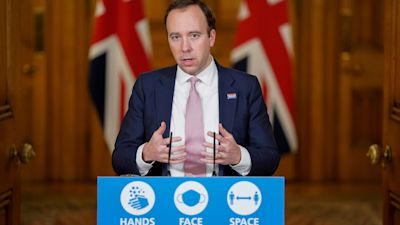Covid-19: Pupils in hardest hit London boroughs to be mass tested

Video report by ITV News Science Editor Tom Clarke
Secondary school pupils in the seven London boroughs with the highest levels of coronavirus will be eligible for mass Covid-19 testing as part of a programme aimed at driving down infection rates.
Health secretary Matt Hancock said all children aged 11-18 in the worst affected London boroughs can be tested whether they have Covid symptoms or not.
It comes after new data showed London had the highest infection rates in England, while rates were also rising in the south-east and east of England. There were 191.8 cases per 100,000 people in the week to December 6 in the capital, up from 158.1 in the previous week.
While it has not been confirmed by Downing Street which boroughs will be tested, figures show the seven London boroughs with the highest Covid rates include:
Waltham Forest
Redbridge
Newham
Barking
Bexley
Havering
Enfield
Mr Hancock told a Downing Street briefing: “The testing results and survey shows us that by far the fastest rise is among secondary school age children 11-18 years old, while the rate among adults in London is broadly flat.
“But we know from experience that a sharp rise in case in younger people can lead to a rise among more vulnerable age groups later."
ITV News' Science Editor Tom Clarke explains how the new mass and mobile testing will work for secondary school pupils
Mr Hancock added: “We need to do everything we can to stop the spread among school age children in London right now – we must not wait until the review, which will take place on December 16. We need to take targeted action immediately.”
The health secretary added he was determined to keep schools open as it is "both right for education and for public health".
Rapid result PCR and lateral flow tests will be used to detect Covid among schoolchildren in London, the health secretary confirmed.
Chief Medical Officer Professor Chris Whitty said the new testing scheme in London would be a good “addition” to helping fight London’s rising Covid rates, but only in conjunction with social distancing and other measures aimed at slowing the spread of the disease.
“The key question is not just testing but how its used and people respond," Prof Whitty has said.
"A testing program is a useful addition to other things.
“On its own it is not capable of turning the tide if things are going very badly.”
He also said a third wave was not inevitable, and warned against being too lax with measures over the Christmas period.
“Just because we can do things, doesn’t mean we should do thing,” said Professor Chris Whitty.
“People should be sensible over that period as this is a whole period of risk.”
Further details about the mass testing programme would be announced on Friday, the health secretary added.
It comes as Wales announced secondary schools and colleges will not open from Monday in a bid to drive down Covid rates and also to allow people to self-isolate for 10 days before seeing elderly relatives or friends at Christmas.
Despite rising infection rates, a review on whether London could be moved into Tier 3 is not expected until Wednesday, December 16.
Mr Hancock said he “didn’t want to pre-empt” any decision about whether the capital might be moved into stricter restrictions ahead of the deadline.
Professor Chris Whitty added that rising rates of infection in the south-east were “concerning” and that questions would have to be asked about whether more measures were needed.
“Of course we’re concerned and anyone living in those areas is going to be concerned,” he said.
“Throughout this there’s a very difficult balance where if we don’t do a sufficient number of things the rates start to go up.”
Prof Whitty added that rates were falling “really quite consistently” in areas such as the Midlands where stricter regulations had been adhered to.
NHS Covid app to offer self-isolation payments
England and Wales's NHS Covid-19 contact-tracing app will add a new feature to allow those told to self-isolate to apply for a £500 grant, Mr Hancock also announced.
Low income households were previously only offered the payment if they had been told to self-isolate by human Test and Trace operators, rather than the app.
Experts believe it may mean more people will follow the guidance now additional funds are being offered up.